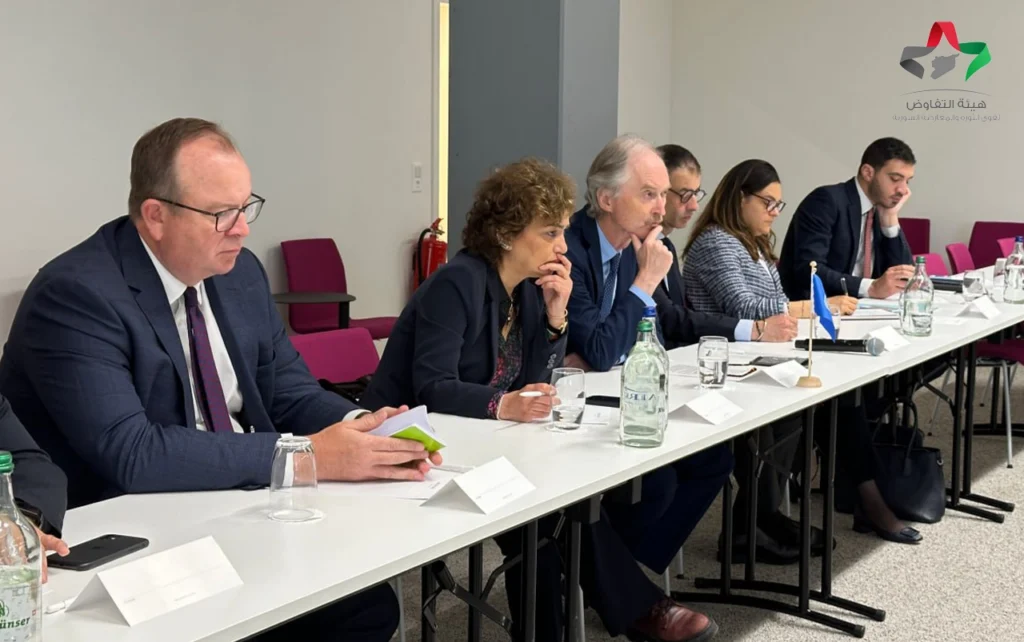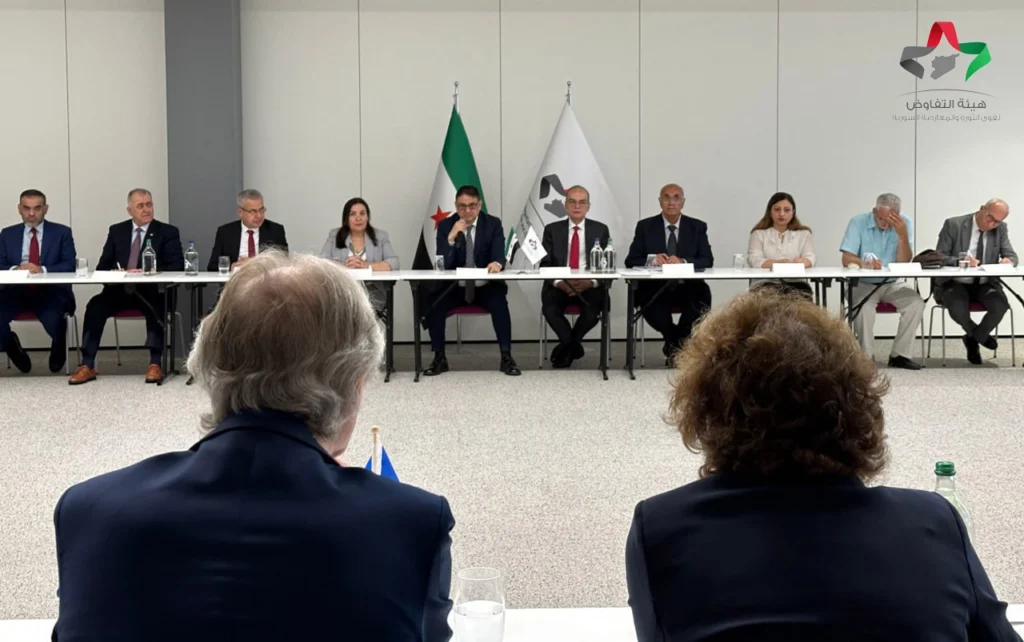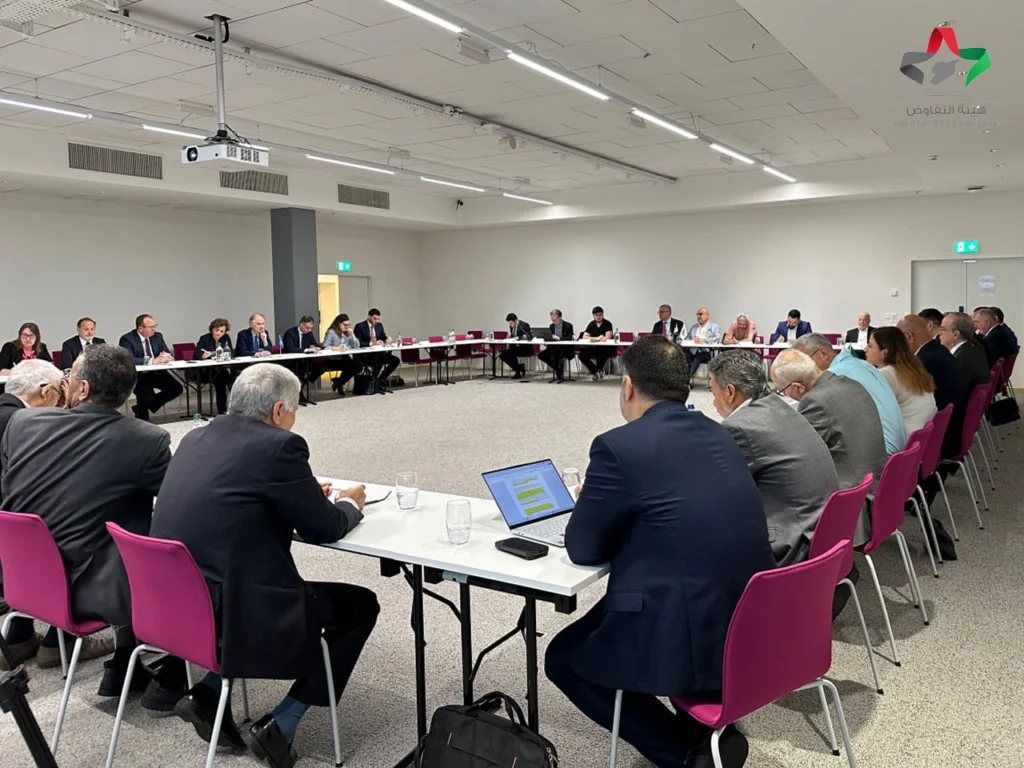Syrian Negotiations Commission Meets with UN Envoy to Syria
Jamous: We Will Not Accept Solutions at the Expense of the Syrian People

June 10, 2024
The Syrian Negotiations Commission met with United Nations Special Envoy to Syria, Mr. Geir Pedersen, and his team in Geneva on Monday. The discussions focused on revitalizing the political process, the role of the United Nations and the Security Council in implementing UN resolutions for a political solution, and establishing binding mechanisms to prevent any party from obstructing the political solution.
This meeting with the UN envoy coincided with the start of the regular Commission meeting. Commission President Badr Jamous expressed hope that the United Nations would actively advance the political process in Syria and find mechanisms to restart negotiations disrupted by the Syrian regime. He emphasized that the Commission partners with the United Nations because it believes a political solution in line with UN Resolution 2254 is the only way to end the Syrian tragedy and achieve sustainable security and stability.
Jamous stressed the importance of developing practical ideas to advance the political process, warning that any attempt by some states to solve their problems at the expense of the Syrian people is unacceptable and will cause additional problems.
He highlighted a unified vision among the Commission, civil society groups, and broad segments of Syrians. Coordination has deepened with Syrian communities inside Syria and in the diaspora, driven by the Commission’s belief in the importance of joint and integrated efforts to achieve the desired political solution.
Jamous held the Syrian regime, along with the United Nations, Security Council members, and regime-backing countries, responsible for the faltering political solution. Nonetheless, he affirmed the Commission’s readiness to discuss a comprehensive solution that includes the four baskets, provided the transitional governance basket is among them. He also expressed the Commission’s willingness to draft a constitution or complete chapters of a proposed constitution if the Syrian regime shows seriousness. This confirmation responded to disputes over the location of the Commission’s meetings.
Jamous called on friendly countries and the United Nations to address the education issue and ensure quality and equal education for all Syrian students. He proposed forming a UN committee to supervise education, as the regime and some separatist parties are using varied curricula to consolidate division.
He also warned that elections planned by the Autonomous Administration in northeastern Syria are an attempt at division by an illegitimate administration affiliated with a terrorist organization. He rejected the regime’s parliamentary elections, citing their lack of legitimacy.
Jamous cautioned against misusing the terms “safe and neutral environment,” stating that early recovery should not aid the regime or enable free normalization with it. Instead, he advocated for using “confidence-building measures,” as a safe and neutral environment is a task for the Transitional Governing Body within the political solution context.
Mr. Pedersen emphasized the ongoing international consensus that UN Resolution 2254 is the only political solution to the Syrian crisis, noting that the entire UN Security Council supports it, though there are differing views on its implementation. He warned that a lack of progress in the political process would negatively impact all other Syria-related issues and expressed dissatisfaction with the situation’s development.
Pedersen stated that no single party can achieve stability in Syria. Advancing the political process requires a comprehensive approach involving the Syrian opposition represented by the Syrian Negotiations Commission, the Syrian interim government, and the four most influential parties in Syria: the United States, Russia, Iran, and Türkiye. Support from Arab states and the European Union is also necessary.
The UN envoy highlighted Syria’s economic collapse and the nearly 17 million Syrians needing humanitarian aid, warning of increasing needs amid declining international funding.
Regarding the Constitutional Committee, Pedersen noted that Russia refused to come to Geneva, a decision the Syrian regime followed. Attempts to convene the Committee in several capitals failed, with most locations rejected by the regime. Thus, Geneva remains the proposed and realistic option until the Syrian parties agree on another location. He proposed that the regime’s government draft a constitution or constitutional chapters, presenting this challenge to the Syrian opposition to overcome the venue factor and prevent disrupting the Committee’s work.
Pedersen reiterated that neither the Constitutional Committee nor any other initiative can solve the Syrian crisis alone. A comprehensive approach is needed, starting with a political solution, activating the Constitutional Committee’s work, addressing elections, implementing confidence-building measures, resolving the refugee and displaced people issue, consolidating Syrian sovereignty, and other related issues.
Participants in the meeting with the UN envoy included members of the Negotiations Commission, representatives of various components, and representatives of Syrian civil society organizations and research centers. Some Commission members and civil society group guests provided suggestions related to the political solution, and questions were raised about the UN envoy’s work methodology and strategies.
Media Office

